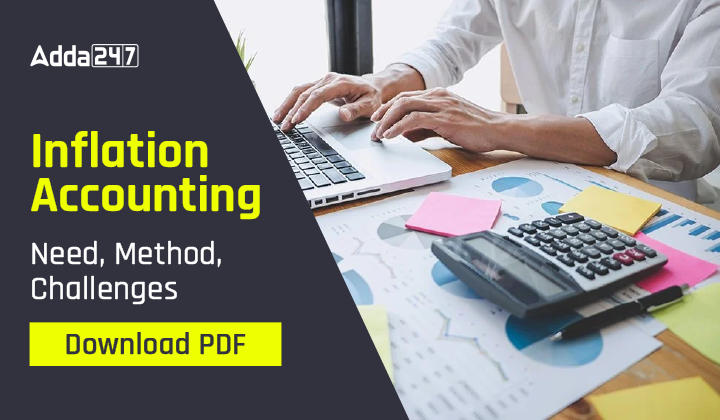Table of Contents
Accounting refers to recording, classifying, summarizing, analyzing and interpreting financial information. But the serious drawback is that it is based on historical figures which are not at all adjusted as per the price changes occurring in the regular environment. For including this perspective of rising prices in our accounting information the concept of international accounting came into existence. In this article, we will learn details of the topic of Inflation accounting.
What is Inflation?
Inflation normally refers to the increasing trend in the general price level. It is a state in which the purchasing power of money goes down. In accounting, inflation refers to the general rise in prices of goods and services over time, resulting in a decrease in the purchasing power of money. Inflation impacts the financial reporting of a company, as it affects the value of assets, liabilities, revenues, and expenses.
What is Inflation Accounting?
Inflation accounting is a specialized accounting method that takes into consideration the impact of inflation on financial reporting. It is the process of adjusting the financial statements of a company to show the real financial position of the company during an inflationary period and to adjust the financial information of a company to reflect changes in purchasing power due to inflation, where assets and liabilities are recorded at their original values.
Inflation accounting is useful for companies that operate in economies with high inflation rates or for companies that hold significant assets or liabilities that are subject to changes in prices due to inflation. It can provide a more accurate reflection of a company’s financial health and performance in an inflationary environment.
Need for Inflation Accounting
Inflation accounting is a specialized accounting method used to adjust financial statements for the effects of inflation, or the general rise in prices over time. It is used to provide a more accurate representation of a company’s financial position and performance in an inflationary environment. Here are some key reasons why inflation accounting is important:
- Reflecting True Financial Performance: Inflation can distort the financial performance of a company by eroding the purchasing power of money over time. Traditional accounting methods do not account for changes in the value of money due to inflation, leading to inaccurate financial statements..
- Facilitating Comparability: Inflation accounting allows for a meaningful comparison of financial statements across different periods. Without inflation adjustments, financial statements from different years may not be directly comparable due to changes in the purchasing power of money. It helps in better comparison of performance over time.
- Enhancing Decision-making: Inflation accounting provides decision-makers with more accurate and relevant financial information for making informed decisions. In an inflationary environment, traditional accounting methods may understate revenues, overstate expenses, and result in distorted financial ratios
- Meeting Regulatory Requirements: Companies may be required to prepare financial statements by inflation accounting standards. This is particularly relevant in economies with high inflation rates where regulatory bodies may mandate the use of inflation accounting to ensure accurate financial reporting.
- Addressing Stakeholder Needs: Stakeholders such as investors, lenders, and analysts may require inflation-adjusted financial statements to assess the financial performance and stability of a company, especially in inflationary environments.
Methods of Inflation Accounting
There are different methods to inculcate the effect of price level changes in accounting data. These are discussed below:
- Current Value Accounting Method: Current value accounting method is also known as the Fair Value Accounting Method. Under this method, all assets and liabilities are shown at their current value on the balance sheet. Net assets value at the beginning and at the end of the accounting period is determined and the difference among both these values is termed as profit or loss whatever the case may be.
- Current Cost Accounting Method: Under the current cost accounting method, assets are shown in financial statements i.e. balance sheet and profit and loss account at their current cost instead of recording them at historical cost or original value.
- Replacement Cost Accounting: In this method, the cost of replacing an asset or inventory item is calculated based on the current market prices of comparable assets or inventory items. It is a valuation method used in accounting and finance to determine the value of an asset or inventory item based on the cost to replace it at its current market value.
- Current Purchasing Power Accounting Method: It is an accounting technique under which companies are required to record and present their financial statements on historical figures. Whereas a rise or fall in items price is ignored.
Inflation accounting Challenges
Inflation accounting presents several challenges, including measurement issues judgmental decisions, and practical difficulties. Some of the key challenges in inflation accounting are:
- Selection of Appropriate Inflation Rate: One of the challenges in inflation accounting is the selection of an appropriate price index or inflation rate. The choice of index or rate can significantly impact the restated financial statements and the resulting financial ratios. Different inflation rates may yield different results, and the selection of an appropriate index or rate requires careful consideration of various factors, such as the nature of the business, the currency of the financial statements, and the availability and reliability of data.
- Measurement of Assets and Liabilities: Different assets and liabilities may be affected differently by inflation, and the appropriate method of restatement may vary depending on the nature of the items. For example, tangible assets such as property, plant, and equipment may be restated based on their replacement cost, while financial assets such as investments may be restated based on their market value.
Inflation Accounting : Need, Method, Challenges,Download PDF




 KTET 2025 Notification Out, Exam Date, A...
KTET 2025 Notification Out, Exam Date, A...
 AP DSC Answer Key 2025 Out, Download Res...
AP DSC Answer Key 2025 Out, Download Res...
 CSIR NET Admit Card 2025 @csirnet.nta.ac...
CSIR NET Admit Card 2025 @csirnet.nta.ac...




